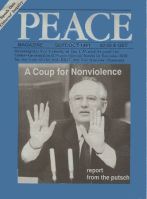
Peace Magazine Sep-Oct 1991, page 28. Some rights reserved.
Search for other articles by Jean Smith here
Ivan L. Head, University of Toronto Press, 244 pages, $35.00. Reviewed by Jean Smth
Ivan Head's new book is a timely guide for peace activists and environmentalists. It stresses that we could be freed from squandering resources on military equipment, so hypocritically promoted by Cold Warriors and the military-industrial complex, and start to protect the world from the real problems that beset us. Head demonstrates that poverty, debt, environmental degradation, political instability and over-population in the developing world cannot be ignored on the grounds that they do not affect us. We lose jobs in export industries when poor countries can't afford to buy our products; we experience terrorism when political disputes are carried into our territory (witness the bombing of Air India flight 182); we receive an increasing number of refugees who are fleeing from both political and environmental horrors. He argues that we have a chance to change this pattern if we are willing to use compassion, wisdom and even good business sense.
This book is based on a series of studies around the theme of global disequilibria. The studies were organized by the International Development Research Centre (IRDC), of which Head was president for thirteen years, until his retirement a few months ago. The IRDC has a mandate to assist developing countries in utilizing science and technology for the benefit of their populations. I would suggest that it is because the benefits are for "their" populations that the federal government has recently reduced support for the IRDC. Shortsightedness has prevented the Mulroney government and others before it from understanding that assisting other countries to become more stable would be mutually beneficial. Weapons sales make more money in the short run.
Head graphically depicts his compassion for those who suffer and his anger at those who profit from the arms race. He writes: "Among the most repulsive of images common in today's world is that of the immaculately tailored, overweight, retired military officer from a NATO country seated in a hotel bar in a developing country hotel peddling his deadly weapons to local middlemen anxious for their commissions."
One of the many strong points in this book is that it reminds us that we have pockets of third world conditions in our own country: some native communities, that have been produced by the same arrogance, indifference and ignorance we've shown towards the Third World. Complementary reading for A Hinge of History would be Geoffrey York's The Dispossessed: Life and Death in Native Canada (Vintage 1990, 291 pp., $7.95).
On A Hinge of History is very well written and conveys a sense of urgency which will certainly recharge the batteries of weary peace and environmental activists. It gives us ways to be more effective in arguing for a better world for everyone, everywhere.

Peace Magazine Sep-Oct 1991, page 28. Some rights reserved.
Search for other articles by Jean Smith here